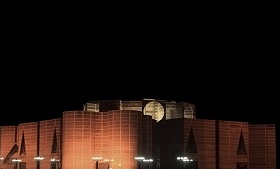Published: 18 March 2014
The ninth parliament during its tenure of five years from January 2009 to November 2013 witnessed record high boycott of parliamentary sessions (342 out of 418 working days, almost 82%) by the main opposition. Plus rampant quorum crisis wasted more than 222 hour; the estimated of cost of which is more than Tk 104 crore. These were revealed at the press launch of “Parliament Watch on Ninth Parliament” – a regular study conducted by Transparency International Bangladesh (TIB) over the years to assess the governance situation of the national parliament. To overcome this noxious practice, TIB recommended for enacting law banning parliament boycott. Juliet Rosettee, Programme Manager and Morsheda Akter, Deputy Programme Manager, Research and Policy, TIB presented the findings of the study at the press launch on 18 March at capital’s CIRDAP auditorium. M Hafizuddin Khan, Member, Board of Trustees; Dr Iftekharuzzaman, Executive Director and Dr Sumaiya Khair, Deputy Executive Director, TIB were also present. TIB initiated its “Parliament Watch” study back in 2001 and till 2014 a total of 10 reports have been released.The study shows MPs in the ninth parliament had spent very little time (8.2 percent) of the total 1331 hours in the 19 sessions of the last parliament in the law-making process and only 57 of the 350
|
lawmakers took part in the law-making process, taking about 12 minutes on average to pass a bill. It was about 20 minutes in the eighth parliament, the study revealed. It also added that, people's participation in the law-making process was not ensured.Besides, it is alarming that the number of businessmen-turned-MPs is increasing. In the ninth parliament, it was 57 percent, compared to 17.5 percent in the first parliament. On the other hand, the number of lawyers-turned-MPs is decreasing. It was 14 percent in the last parliament. Although the budget session is the best opportunity for lawmakers to speak in the House, 32 MPs did not take part in the budget discussion in the last parliament.Lack of strong political will is making the parliament weak and less effective and there is no alternative but a strong opposition to make the parliament effective- M Hafizuddin Khan On the positive side, the attendance of lawmakers in the ninth parliament rose to 63 percent from 55 percent in the previous one.The formation of all parliamentary committees in the first session is another positive side of the ninth parliament. But the culture of parliament boycott and poor participation of women MPs in the law-making process are among its other negative sides. |
|
|








